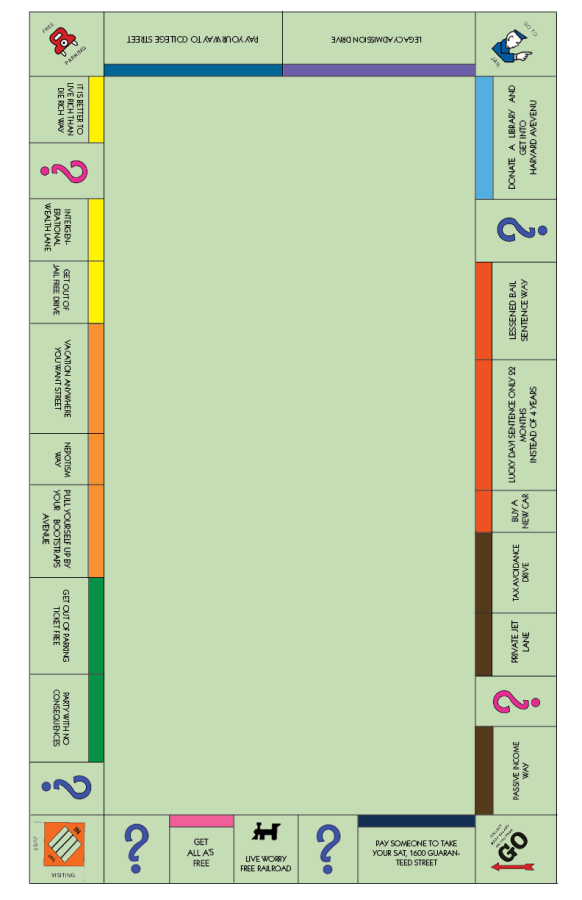Money can buy everything
Graphic illustration by Emily Pedroza, Anushka Anand,and Daeun Chung
A game of monopoly that is rigged to favor the wealthy permanently reflecting the systems that characterize everyday life.
February 6, 2023
The popular saying money can’t buy everything isn’t always true. Wealthy individuals have found a loophole in the rule, gaining advantages such as nepotism in employment and legacies in college admissions. Unknowingly, the world has built a system giving those with more wealth an unfair advantage. The wealthy should acknowledge their advantages instead of acting like they are self-made.
According to the National Broadcasting Company, the Bay Area is the eighth most expensive city to live in the U.S., surrounded by houses overvalued and inflated by millions of dollars. For much of the population, money is not scarce. In the last decade, the overall trend of wealth has increased, leading to the title of a “New Gilded Age” with wealth accumulation in the top 1%, surpassing the 1890s. In the Bay Area, with an increasing number of tech companies and innovations blooming, the average person’s income has increased, leading to an increase in the percentage of privileged people.
“Wealth and money has definitely increased from the 1920s to now, and as far as I can predict, it’s going to keep increasing,” De Anza Economics Professor Judith West said. “This happens for a number of reasons including inflation and more opportunities for high income jobs.”
The relationship between wealth and privilege allows people with more money to get unfair advantages in education and employment. Many students living in the Bay Area benefit from educational privilege because of the economic landscape. At Lynbrook, students are offered a diverse range of clubs which participate in costly competitions, and have opportunities which often are not offered in schools with less funding.
Legacy admissions are also a common advantage of those with financial privilege. Students become a legacy with better chances of admission when someone in their family goes to a top college, which often requires high tuition. According to an NPR article, compared to non-legacy students, students with legacy have five times higher chance of acquiring admission. People criticize affirmative action for supposedly unfairly lifting students from lower socioeconomic classes and giving them the chance to go to college. Yet, they do not have a problem with legacy admissions which is essentially affirmative action for the rich.
“I don’t think legacy admissions are fair, especially since it helps people who have more money and the predominantly white population,” senior Akul Murthy said. “The new waves of immigrants and first generation Americans are at a disadvantage.”
Nepotism in employment is another advantage of being wealthy. With wealthy parents, people do not need to work as hard to get where they need to be. In Hollywood, many actors and models are considered “nepo-babies,” with parents who earned their spot and pulled their children up alongside them. Since the children are privileged, they get the first pick of roles or jobs even if they are not very skilled. Hailey Bieber and Lily-Rose Depp are some of the most notable examples making headlines today.
Today, even the justice system has tipped its scales in favor of the wealthy. The courts are more lenient with the wealthy, making them pay less in comparison to those who are not as advantaged.
“We can’t deny the fact that some lower income communities don’t have access to more expensive lawyers and don’t get seen fairly in front of a jury,” Murthy said.
Jordan Belfort, the wolf of wall street, spent a mere 22 months in jail after scamming more than 1,500 individual investors of $200 million. He was initially sentenced to four years, but his sentence was reduced after making a plea deal with the FBI. The penalty for first-time drug possession offenses can range between 2-20 years and a hefty fine, depending on the state. The most ironic part is that Belfort was a notorious drug user himself. He is one of many examples of the rich getting lesser jail time because they can bargain financial deals.
Often, the government is funded with donations from the wealthy classes; in return, the courts become more lenient toward these families. The government has bestowed many gifts on wealthy individuals and corporations. For years, businesses have tried to get Congress and state legislatures to enact sharp limits on class-action lawsuits. In a series of rulings, including a high-profile one against Wal-Mart in 2011, it has become more difficult for workers and consumers to band together in class action lawsuits, which are often the only way for working-class people to get justice.
“In terms of the justice system, the judges in the Supreme Court have many times favored people who are advantaged,” West said. “But, in the future I believe that people who are wealthy will get less privilege because of culture now and people being called out for their actions.”
Although people who enjoy wealth and privilege are leading the world, they need to be more appreciative of the advantages that come with being in the top one percent by recognizing the fact that they are privileged.



































































